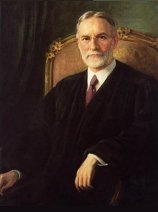Sixth Amendment Court Cases
- Right to Counsel Clause
Each of these Sixth Amendment Court Cases is somehow significant to the way the Supreme Court has interpreted the Right to Counsel Clause in the Sixth Amendment to the US Constitution. Well, most are significant, some are just interesting! You can read about the history and meaning of the Sixth Amendment here.
Sixth Amendment Court Cases
Prior to 1932, the Right to Counsel Clause was generally understood to mean that people could hire an outside attorney to represent them in court if they wanted to do so and if they could afford to do so. The clause was not understood in the context of which it is understood today, that is, that the right means that people should have a court appointed attorney, paid for at the public's expense, if they cannot afford to hire one on their own. Starting with Powell vs. Alabama, in 1932, a series of Supreme Court decisions were made that changed the traditional understanding of this clause. The following cases will give you an understanding of how that process occurred.
Sixth
Amendment Court Cases - Right to Counsel Clause cases -
Powell vs. Alabama
In Powell vs. Alabama,
1932, several black youths were charged and convicted with raping two
young white women. The case was appealed all the way to the Supreme
Court where the Court threw out the convictions of the young men based
on the fact that they had not been able to obtain the assistance of an
attorney during their trial.
The case was handled hastily and because of the boys' young age, they
were not competent enough to understand the trial procedures or
represent themselves. They were also held in a state far away from
their parents and were burdened with the inability to easily
communicate with them. Supreme Court Justice George Sutherland
delivered the Court's opinion and stated, in part:
 Supreme Court Justice George Sutherland Source: The Collection of the Supreme Court of the United States (Artist: Nicholas R. Brewer)
Supreme Court Justice George Sutherland Source: The Collection of the Supreme Court of the United States (Artist: Nicholas R. Brewer)"In a capital case, where the defendant is
unable to employ counsel and is incapable of making his own defense
adequately because of ignorance, feeble-mindedness, illiteracy or the
like, it is the duty of the court, whether requested or not, to assign
counsel for him as a necessary requisite of due process of law, and
that duty is not discharged by an assignment at such a time and under
such circumstances as to preclude the giving of effective aid in the
preparation and trial of the case."
This case established that people had a right to counsel, whether
they could afford it or not, in capital cases, that is, where the death
penalty was allowed. It only applied to the Federal government, though,
not the state governments. The right to have an appointed counsel in
state cases, whether or not one could afford it, was not established
until later.
Justice Sutherland also made a very famous statement about the
necessity of counsel in criminal cases, even for intelligent and
educated people. He said:
"The right to be heard would be, in many cases, of little avail if it did not comprehend the right to be heard by counsel. Even the intelligent and educated layman has small and sometimes no skill in the science of law. If charged with crimes, he is incapable, generally, of determining for himself whether the indictment is good or bad. He is unfamiliar with the rules of evidence. Left without the aid of counsel he may be put on trial without a proper charge, and convicted upon incompetent evidence, or evidence irrelevant to the issue or otherwise inadmissible. He lacks both the skill and knowledge adequately to prepare his defense, even though he have a perfect one. He requires the guiding hand of counsel at every step in the proceedings against him. Without it, though he be not guilty, he faces the danger of conviction because he does not know how to establish his innocence."
Sixth Amendment Court Cases -
Right to Counsel Clause cases -
Johnson vs. Zerbst
In Johnson vs. Zerbst,
1938, two United States Marines had been convicted of possessing
counterfeit money. They had received counsel during preliminary
hearings two months before their trial, but at the trial itself, they
did not have any attorneys representing them. They were notified of the
charges, tried, convicted and sentenced all in one day and sent to a
federal penitentiary two days later. They did not immediately appeal
their case because they did not know they could and had no legal
counsel to advise them.
 The Supreme Court of the United States
The Supreme Court of the United StatesThe defendants appealed their case all the way to the Supreme Court,
alleging that their Sixth Amendment right to counsel had been denied.
The Court agreed with them and reversed their conviction. In this case,
the Court established that defendants have the right to have an
attorney appointed for them by the Court in all federal criminal cases,
regardless of the defendant's understanding of his right to counsel.
The lower court had said that it was "unfortunate" that the men did not
understand that they had a certain amount of time in which their appeal
must be filed. They were not aware of the deadline because they had no
attorney to inform them, nor did they ask for one. The lower court did
not find that the trial court had any obligation to inform the men of
their right to counsel and just assumed that the defendants were
waiving their right to counsel because they did not have any present.
The Supreme Court thought this was completely contrary to the clear
purpose of the Right to Counsel Clause, which is to protect people from
being convicted because of their ignorance of legal procedures, and
judged that the trial court must investigate whether or not the
defendant understands his right to counsel and his right to waive that
counsel if he desires. If he is waiving the right to counsel, the court
must make clear record of it, including the reasons for doing so. If
the court establishes that waiving the right to counsel would not be in
the interest of the defendant, the court must appoint an attorney for
him itself.
Sixth
Amendment Court Cases - Right to Counsel Clause cases -
Gideon vs. Wainwright
Gideon vs. Wainwright, 1963, was the case the Supreme Court used to
apply the 6th Amendment's Right to Counsel Clause to the states. Before
this time, from the inception of the 6th Amendment, the Amendment had
applied only to the Federal government.
In Gideon, a man was convicted in Florida without having an attorney. The man had
requested a court appointed attorney, but was denied because Florida
law only required court appointed attorneys in death penalty cases. The
case was appealed to the Supreme Court, which agreed with the
defendant, that his 6th Amendment right to counsel had been denied him,
violating the 14th Amendment's Due Process Clause.
The 14th Amendment's Due Process Clause required all states to give all
citizens due process of law. The Amendment was added to the
Constitution after the Civil War in order to protect former slaves from
unequal treatment by Southern governments. The Supreme Court over the
years began to interpret the Due Process Clause as meaning that all
states must abide by the limitations placed upon the Federal government
in the Bill of Rights.
Sixth Amendment Court Cases - Right to Counsel Clause cases -
Scott vs. Illinois
Scott vs. Illinois,
1979, was a case involving a defendant who was convicted of shoplifting
and fined $50 in a bench trial. The applicable Illinois law stated that
the maximum penalty for the crime was a $500 fine or one year in jail,
or both. The defendant appealed the case claiming that his 6th
Amendment right to counsel had been violated because he did not have
personal means to hire an attorney and the court had not appointed one
for him.
The Court disagreed with the defendant. Before this case, the Court's
rule had been that if imprisonment was even a possible punishment, the
defendant was entitled to appointed counsel. In this
case, the Court ruled that just the fact that imprisonment was a
possible punishment alone did not require that an attorney be
appointed. Instead, the Court said that imprisonment must be the actual
sentence laid down in order to require the court to appoint an attorney
for the defendant.
Read
more about the history and meaning of the Right to Counsel Clause here.
Read
more about the history and meaning of the 6th Amendment here.
Learn more about Sixth Amendment Court Cases relating to the following
Sixth Amendment clauses:
Sixth Amendment Court Cases - Speedy
Trial Clause
Sixth Amendment Court Cases - Public
Trial Clause
Sixth Amendment Court Cases - Right
to Trial by Jury Clause
Sixth Amendment Court Cases - Arraignment
Clause
Sixth Amendment Court Cases - Confrontation
Clause
Sixth Amendment Court Cases - Compulsory
Process Clause
If you would like to read about the meanings of each amendment, go to
the First
Ten Amendments page here.
Amendments:
Preamble
to the Bill of Rights
Learn
about the 1st Amendment here.
Learn
about the 2nd Amendment here.
Learn
about the 3rd Amendment here.
Learn
about the 4th Amendment here.
Learn
about the 5th Amendment here.
Learn
about the 6th Amendment here.
Learn
about the 7th Amendment here.
Learn
about the 8th Amendment here.
Learn
about the 9th Amendment here.
Learn
about the 10th Amendment here.
Read
the Bill of Rights here.
Like This Page?
© 2008 - 2022 Revolutionary-War-and-Beyond.com Dan & Jax Bubis










Facebook Comments